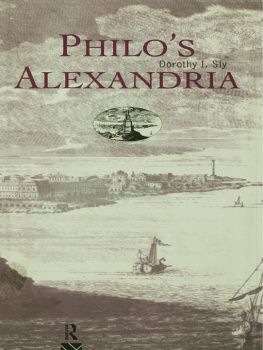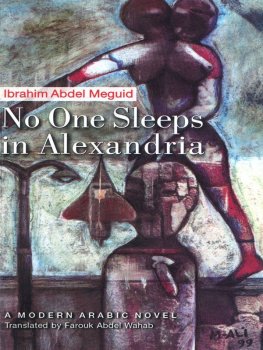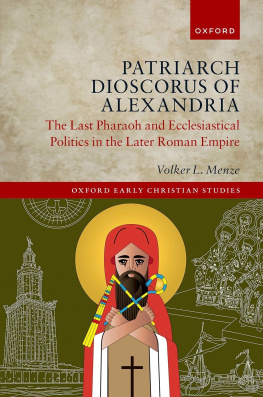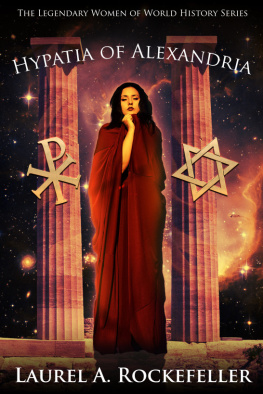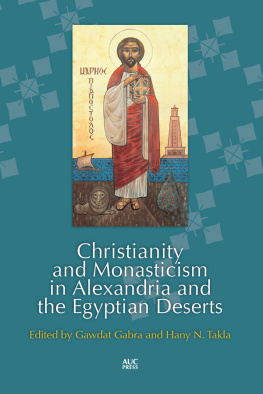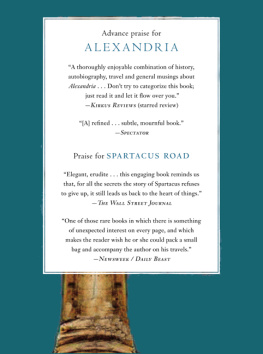PHILOS ALEXANDRIA
PHILOS ALEXANDRIA
Dorothy I. Sly
First published 1996
by Routledge
11 New Fetter Lane, London EC4P 4EE
Simultaneously published in the USA and Canada
by Routledge
29 West 35th Street, New York, NY 10001
1996 Dorothy I. Sly
Typeset in Garamond by
Florencetype Ltd, Stoodleigh, Devon
Printed and Bound in Great Britain by
Biddles Ltd, Guildford and King's Lynn
All rights reserved. No part of this book may be reprinted or
reproduced or utilized in any form or by any electronic,
mechanical, or other means, now known or hereafter
invented, including photocopying and recording, or in any
storage information retrieval system, without permission in
writing from the publishers.
Briti~h Library Cataloguing in Publication Data
A catalogue record for this book is available from the British Library
Library of CongreJJ Cataloguing in Publication Data
A catalogue record for this book has been requested
ISBN 0-415-09679-0
for Sophia and Valerie
the wise and the strong
ILLUSTRATIONS
TABLES
| The Julio-Claudian emperors |
| Philos treatises arranged by category |
MAPS
| Eastern Mediterranean before the founding of Alexandria |
| Plan of Alexandria |
| First-century Alexandria |
| Alexandria and vicinity |
FIGURES
PREFACE
This is a book about a man and his city. Both have already been written about separately and very thoroughly. P.M. Frasers three-volume Ptolemaic Alexandria is a magnificent reference work about the city in the three centuries before the Roman conquest. And starting with Goodenoughs An Introduction to Philo Judaeus and Sandmels Philo of Alexandria, one can move through an ever-expanding library of works about Philos thought. Why not be content with these?
There are some obvious reasons. Frasers monumental work ends with the dawn of the Roman Empire. It does not touch the first half of the first century of our era, a period when ethnic tensions in Alexandria exploded into ugly violence. Nor does it attempt to reconstruct the social life of the city. Furthermore, the sheer volume of the work tends to dishearten the non-specialist reader. Size and readability are not problems with the introductions to Philo by Goodenough and Sandmel; I thoroughly enjoyed them at the beginning of my acquaintance with Philo. Nevertheless, they are in some ways seriously outdated. They implicitly require the reader to identify with Philos privileged, educated, elite male viewpoint. Todays readers are not all so malleable. Let me relate a personal anecdote.
The impetus to write something different goes back to the day I defended my doctoral dissertation, called Philos Perception of Women. I was so numb from nervousness that, save for the quick thinking of a friend with a pair of scissors in her briefcase, I would have entered the examination room with the price tag still hanging down from my new dress. Once at the table, I braced myself to respond brilliantly to any query about Philos philosophy, however obscure. The first learned professor tapped the ashes from his pipe, cleared his throat and demanded, Do you like Philo? I had been expecting anything but this! I have no recollection of what I answered in my bewilderment. But I pondered his question after the ordeal was over.
Was I being charged with impudence? An older woman, arguing the thesis that if Philo saw women at all, it was through very murky glasses? Had I lost my academic objectivity, and empathized not with the great Alexandrian philosopher, but with some imaginary soul he had belittled as a mindless member of the citys promiscuous mob?
My continuing dilemma is that I do like Philo. I am drawn to his religious fervour, his idealism, his mysticism. His writing is tedious, yes, but on the third or fourth or even fifth reading it becomes intriguing in its nuances. Nevertheless, I am frequently reminded that Philo was not just a man who put beautiful thoughts on papyrus. He lived in a particular society. He considered himself, probably correctly, as a leading figure in Alexandria, albeit somewhat isolated because of his identity with the Jewish politeuma , or community. What would it have been like to walk beside him, or more probably behind him, in Alexandria, as he went about his civic duties, or as he strolled, deep in contemplation? How did he view the city and its people? Would they have looked to me as they did to him?
The only way to find out was to read Philo once again looking for all the information he yields about life in Alexandria. That is what I have done. Philos writing is the primary source for this book, and I invite the readers to consult the references as we go along, and so to meet Philo for themselves. I hope that they will find it as much of an adventure as I have. I hope also that the book will be a stimulus in either of two directions: to learn more about Philo or about Alexandria.
ACKNOWLEDGEMENTS
My thanks go to the University of Windsor and the Institute for Antiquity and Christianity at Claremont Graduate School, for giving me the time and resources to complete this work. Individuals who gave me special help were my husband Doug Sly, Jane Schaberg, Jon Asgeiersson, Ann Dafoe and members of my graduate seminar in the Department of Religious Studies at the University of Windsor, Winter 1995: April Bulmer, Chris Fraser, Gail Nielsen, Mary Helen Pronger and Tracy Vennebush.
TABLES
The Julio-Claudian emperors
| Augustus, 31 BCE-14 CE |
Tiberius, 14-37 CE |
Gaius, 37-41 CE |
Claudius, 41-54 CE |
| Nero, 54-68 CE |
Philos treatises arranged by category
| A MISCELLANEOUS |
De Aeternitate Mundi (On the Eternity of the World) | Aet. |
De Animalibus (On the Animals) | Anim. |
De Vita Contemplativa (On the Contemplative Life) | Contempl. |
In Flaccum (Against Flaccus) | Place. |
Hypothetica (Apology for the Jews) | Hypoth. |
Legatio Ad Gaium (The Embassy to Gaius) | Legat. |
Quod Omnis Probus Liber Sit (Every Good Man is Free) | Prob. |
De Providentia I, II (On Providence) | Prov. 1-2 |
| B THE ALLEGORY OF THE LAW |
De Agricultura (On Husbandry) | Agr. |
De Cherubim (On the Cherubim) | Cher. |
De Confusione Linguarum (On the Confusion of Tongues) | Conf. |
De Congressu Eritudionis Gratia (On the Preliminary Studies | Congr. |
|

